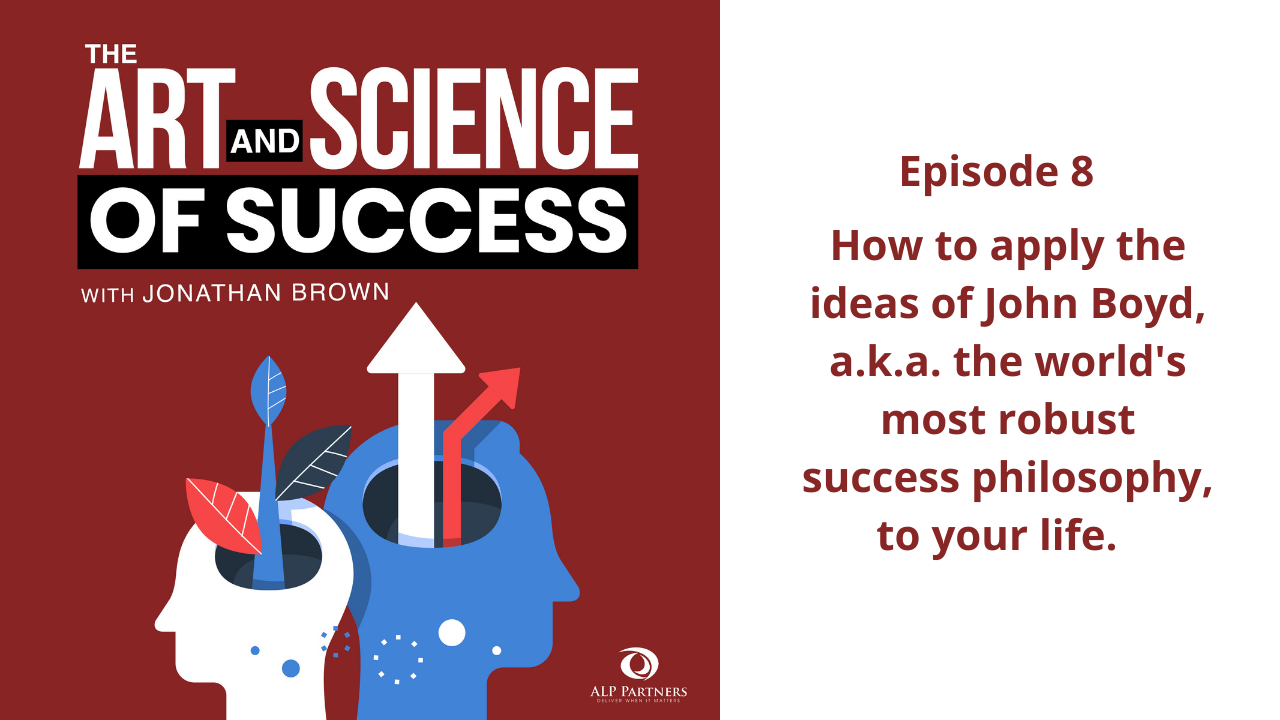
Episode 8: How to apply John Boyd's ideas, a.k.a. the world's most robust "success" philosophy, to daily life.
Sep 07, 2021This week (and next) we are speaking with long time friend and mentor, Chet Richards. Chet is the author of four books, the most famous (and relevant) is Certain to Win: The Strategy of John Boyd, Applied to Business. As many of you will know, John Boyd is the military philosopher whose work ranging from how to win a war to how we can win in non-violent competitive situations, has had such an impact on our work and on the results we help people achieve.
In this podcast, we look at Boyd’s body of work and, following advice from Chet, we read Boyd backwards. That is, we begin where Boyd finished – looking at how someone can win in life or, in Boyd’s words, how to generate vitality and growth and the essence of winning and losing. We then work our way back to look at how we need to adapt when the situation becomes increasingly challenging or contentious.
At first glance, it may not seem to have much to do with succeeding in the non-violent situations most of us face. However, I have found his work to be the most important work I have integrated into my work. Success in stressful situations does not come from bolting on a few extra steps to a philosophy of action designed for peaceful situations. Success comes from figuring out what works in the most stressful situations imaginable and then stripping the ideas back to suit peaceful situations. Then when the contention or conflict increases your philosophy is returning to it’s most natural state. This can give you confidence that your ideas will stand the pressure placed upon them. So I encourage you to give this one a little time to sink in. Now more than ever, we are going to face tests to our philosophy of action.
Here’s the rough outline of our conversation.
00.00 Welcome and Introduction.
02.25 Who was john Boyd and and what did you do with him? (John’s military career, his work figuring what causes someone to win in a dogfight, all the way up to winning in battle.
06.00 Who can handle the fastest rate of change survives.
07.30 Fingertip Intuition (fingerspitzengefuhl) How mastery not resilience is the real key to success in challenging situations.
11.00 Why the Taliban won so quickly.
13.00 The moral (character and relations) is to the physical as three is to one – Napoleon.
15.00 Finding Boyd through Tom Peters – “General, you need to kill more pilots!” Why it’s important to read Boyd backwards.
17.00 The Essence of Winning and Losing. Intuition and the importance of orientation – situational awareness.
21.00 How can we make our under pressure reactions intuitive?
25.50 Boyd and Daniel Kahneman’s Thinking Fast and Slow.
27.30 The Conceptual Spiral – how to win through novelty and mismatches. A.k.a. how to do new stuff?
36.00 Why are mismatches (errors in our understanding or orientation) the most valuable thing to discover?
39.00 How does this relate to both sides of the COVID debate ignoring/shutting down the other?
41.00 Einheit – why mutual trust is essential in a stressful situation.
45.00 Speed and Initiative – what’s the difference and how do they interact?
54.45 Revelation – how to “build snowmobiles” that is how to generate new ideas from the parts of your old ones.
1.02.00 The Strategic Game of ? and ? (The Strategic Game of Isolation and Interaction)
1.06.00 Grand Strategy – how to design a strategy that attracts the neutrals. And the importance of moral isolation.
1.12. Thank you and Close.
BW Jonathan.

